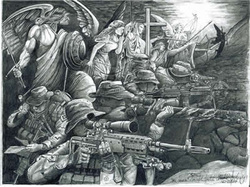 This is the patent age of new inventions for killing bodies, and for saving souls. All propagated with the best intentions. Lord Byron Our friends, the Afghans, not to be confused with our enemies, the Afghans, killed several American soldiers. An unexpected brutality causing the generals to allow rounds in the chambers of the guns of Guardian Angels, who react more quickly than either guardians or angels might alone. I am not being flippant. My personal history is filled with the military, father, husband, son, nephew. But I question brute force in any situation. It never ends well. But this blog is about the writing life, discerning how the writing influences an ordinary life. And vice versa. Today I'm considering intent and belief. Belief that something or someone will behave the way we expect they will, or at least hope they will. We want so badly to believe in another's good intentions. This is true of all human interaction, whether military or romantic. We have a story we've told ourselves, possibly a mythic tale, and when it is transgressed, we are angered, surprised, betrayed. This fascinates me as I've asked myself what I believe my own story is, and how my poems carry that story forward. My beliefs are in my words, a literary DNA sequencing. When I write about a river, this time it is The Willamette, I am making that river a part of my personal story. When I left that river, moved east, I left its elemental resonance, and my story of the river became a part of my mythos. Had the river jumped its banks and flooded my apartment, my story, as well as my belief about the river, would have changed. A poet friend writes obsessively about ice, about snow, about winter. When I read her work, I become colder, I want to be indoors with the heat blasting. Her personal myth developed in a way mine didn't, and I could never tell her story, because I have never felt her story. Myth begins in emotion. Intent and belief are also birthed in emotion. Have you ever been approached and told that your story or poem resonated with someone? And what a shock when they told you why, because they are nothing like you and you didn't intend the meaning they drew from your work. You may have wanted to tell them how wrong they were, but stopped when you realized this was their interpretation made within the realms of their own history, their own beliefs. A book won't become popular unless enough people can make it their own story, can feel the bow tightening in their hands, can fall through a hole and have an upside down tea party with Alice. At some point the reader has to believe. But first, the author had to believe in his or her story enough to create it. That original spark of intent bringing their images to life. We frequently misunderstand intent; this is a basis for discord, for war even. As writers, how important to tell our truths as well as we can, so misunderstandings are fewer. The ideal container for intent and belief is our writing, our literal "story telling." The container, writing, holds both gingerly, our beliefs often morphing over time, our intent softening or changing course. What we believe about someone or something determines our actions. What we believe about ourselves creates our personal mythology and our body of work. If even in summer, we cannot escape the wind and blowing snow, what we write will continue to be based in winter. And who we trust will be based not only on their behavior, but on our interpretation based on our belief about their intent. Are we killing bodies or saving souls with our words?
0 Comments
Leave a Reply. |
Archives
October 2022
AuthorMy writing often deals with the environment, my poetry filled with allusions to natural and man-made disasters. I have unlimited hope though; there is just too much wonder in this world to become a defeatist. To quote Margaret J. Wheatley, '"Hopelessness has surprised me with patience." Categories |
 RSS Feed
RSS Feed
